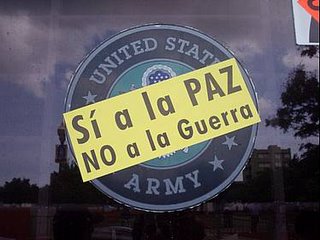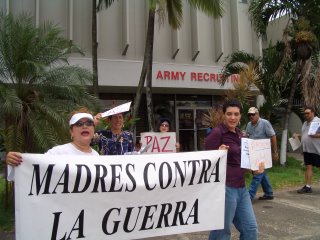Sonia Santiago Hernández de la organización Madres Contra la Guerra que tuvo a su hijo destacado en Irak fue entrevistada por Roberto Barreto de la OSI. He aquí el texto:
¿COMO SU hijo llega al ejército?
BUENO, QUIERO darte el trasfondo de que cuando mi hijo tenía 16 años, residíamos en EE.UU., tu sabes de que los muchachos como condición de entrar a la universidad les hacen llenar una tarjeta aunque supuestamente no es compulsorio el ejército, y entonces yo busqué el apoyo de los cuáqueros y él se declaró, objetor por conciencia.
Lamentablemente, él termina su bachillerato en PR, no consigue trabajo, se frustra, y yo entiendo que el ejército es muy hábil en manipular a los jóvenes, no? El tenía una deuda de un préstamo estudiantil universitario.
Pues entran por la situación de que cuando termines te pagamos la maestría, cuando tu termines vas a tener unos créditos que te van a ayudar a conseguir un trabajo posteriormente, y pues son muchachos que quieren superarse. Nos ha tocado mucho desde el punto de vista emocional, familiar, es horrible.
SEGÚN LO que reporta su hijo, ¿cuál es su situación en el Ejército?
PORQUE ÉL tenía un bachillerato él entró en recursos humanos. Así que cuando fue a Irak, el estuvo trabajando en recursos humanos desde que llegó, procesando licencias por enfermedad, ese tipo de cosas. El llega a Irak el 16 de abril de 2003. Y me dice, "mira mami, esto es solamente por un año, la asignación es por un año".
Lamentablemente en tiempos de guerra, los presidentes tienen comando y Bush decide extender la estadía en Irak a varios batallones. Pues entonces cuando se cumple el año, que fue el pasado abril, le reclasifican su puesto. Y en vez de estar en recursos humanos, lo denominan como infantero. Y ahora el ha estado por ejemplo vigilando un campo de aterrizaje militar y entonces ha estado en muchísimas ciudades y ahora mismo subió a Bagdad.
Como infantero, vigilando en las calles. Pero yo quiero hacerte una aclaración y es que dado el clima represivo del acta patriótica [USA PATRIOT Act], yo no puedo hablar a nombre de mi hijo, yo te hablo en mi carácter como madre.
HA HABIDO muchos reportes de que la situación de los soldados es que no están equipados adecuadamente.
ADEMÁS DE no tener el equipo adecuado, yo quiero hacer de conocimiento al país que debido a la resistencia iraquí, que yo la entiendo, bueno, la justifico en el sentido de que si un país invasor te invade, tu tienes perfecto derecho de defenderte. Y por eso no estoy avalando el gobierno de Saddam, pero ellos están siendo ocupados y yo entiendo su resistencia.
Es precisamente por esa resistencia, que los suministros no llegan, falta agua. Te voy a decir, yo le mando a mi hijo hasta agua, protección solar, cremas de la piel. Entonces actualmente la temperatura allá llega hasta 146 grados diurno. En las noches tienen mucho frío, y hay mucho cambio de temperatura. El agua que están utilizando, y quiero que conste, es agua reciclada.
Existen unas turbinas que la hierven y vuelven y la pasan otra vez como si fuera agua regular. Faltan frutas, faltan vegetales, falta comida fresca. Ellos están comiendo comida enlatada, y disecada en bolsitas. Así que la nutrición deja mucho que desear. Y padecen de estreñimiento. enfermedades de la piel. O sea, están en una condición infrahumana. Ellos están bajo unos toldos sin aire acondicionado y pasan unas vicisitudes extraordinarias.
USTED QUE tiene tiene su hijo allá en Irak, y ha estado viendo todo lo de las revelaciones que han ido saliendo sobre el carácter de la guerra y sobre los propósitos de la guerra. (Nota: Ya regresó el hijo de Sonia Santiago)
ES ECONÓMICA, es por petróleo. Y yo quiero decirte, el pueblo norteamericano cada día repudia más esta guerra y la denuncia. Este es otro Vietnam. El área de Mesopotamia es la segunda más grande en abastos de petróleo. Esta es una guerra orquestada primero, para el control del petróleo. No podemos olvidar que Bush es descendiente de una familia que controla las acciones petroleras.
Todo esto es falso en términos de la guerra de las armas de destrucción masiva, de Al-Qaeda. Y tú sabes lo que más me duele a mí? Que aquellas personas que somos amantes de la paz, sufrimos mucho antes de todo este dolor humano, dijimos que esto iba a ocurrir. Éramos profetas, lo decíamos, pero quien nos hace caso? No tenemos el control.
Las compañías multinacionales capitalistas, se han dividido y privatizado el país. O sea los contratos son 165 mil millones de dólares que se han dividido en términos de "mira pues tu construyes el puente, tu construyes aquello, lo otro", y no dejan, cotizar a nadie más que no sean aliados de Inglaterra o de EE.UU. Eso yo lo tengo muy claro.
EN TÉRMINOS del desarrollo del movimiento contra la guerra, nosotros pasamos de los 10 millones de personas en el mundo que en febrero 15 de 2003 se movilizaron para impedir que la guerra sucediera.
INCLUYENDO ESCUDOS humanos, que fue un acto de mucha honra.
Y LUEGO hubo un poco de baja en la lucha. Y entonces, poco a poco se ha ido generando un movimiento.
DE MASAS.
ESTE MOVIMIENTO incluye el desarrollo de organizaciones de los familiares como Military Families Speak Out y Bring Them Home Now.
TENEMOS POR ejemplo Mothers Against the War, que ese es el grupito con el cual más me comunico. Estamos, entiendo yo, en una época donde los medios de comunicación han traído visuales que la gente ha visto. Por ejemplo...yo entiendo también que hay una resistencia dentro del ejército norteamericano.
Porque esas fotos, y reitero que yo no estoy hablando a nombre de mi hijo, pero yo he visto fotos de eso de la prisión, y los que las sacan son los mismos soldados que están allí, que no se sienten que esta guerra era justificada. Inclusive yo recibí un correo electrónico de un soldado que dice "qué pantalones, lo de Bush, después que declara la guerra unilateralmente, entonces ahora pide que las Naciones Unidas avalen su decisión y lo apoyen y le envíen refuerzos militares, eso es inaudito", tu sabes.
Hay mucha resistencia...yo entiendo que la guerra de Vietnam acaba cuando es la comunidad, las comunidades, y los soldados que regresaron...Me acuerdo, el grupo de...y todavía existe, Vietnam Vets Against the War. Y en la medida en que estos movimientos cobren auge, van a seguir ejerciendo presión sobre sus respectivos políticos.
Por eso es que yo entiendo que es bien importante crear conciencia en Puerto Rico. Tu vez a una [gobernadora] Sila [Calderón] cuasi casada con las políticas de Bush. Cuando se declara la guerra de Irak ella le hace un llamado al pueblo de Puerto Rico para denunciar a Saddam. Y Aníbal Acevedo Vilá [candidato a la gobernación], cuando va allá, es una especie de apoyo tácito a la ocupación en Irak.
O sea, que...tenemos un gobierno en Puerto Rico que tiene un historial nefasto. Que cuando la guerra de Vietnam pasaron una resolución aquí apoyando la guerra de Vietnam. Y que no han tenido la valentía, la osadía de declararse en contra de esta guerra injusta e inmoral.
AQUÍ HA habido 17 casos que se conocen bien de puertorriqueños, que han muerto en Irak. (Al momento de la republicación de esta entrevista son 48 los boricuas muertos en Irak y Afagnistán.)
¿Ustedes han podido conocer a algunos de sus familiares?
SÍ, HEMOS visitado a algunos de los familiares. De hecho, participamos en el entierro de la familia Mora López, allá en Arecibo, que fue el último que murió. Incluso tenemos entendido que hay un herido boricua, en el mismo asalto en que muere el muchacho de Arecibo que está en un hospital militar en Chicago...Pero yo creo en el internacionalismo. Y yo también quiero hacer mención de los más de 45,000 muertos iraquíes.
Porque hasta donde yo sé el pueblo iraquí no ha invadido jamás a Puerto Rico y nosotros no tenemos ninguna vendetta contra ese país. Entonces yo quiero que se entienda también que la misión de madre también es en solidaridad a las madres de los muertos iraquíes...
Nosotros nos solidarizamos con el pueblo iraquí ante la ocupación. Esto ha sido un retroceso histórico. Cuando se acabaron la época de las cruzadas, los gobiernos invasores dijeron que las guerras preventivas no se podían dar para poder haber estabilidad y desarrollar los respectivos países porque se estaban aniquilando. Bush trae, un retroceso histórico al medioevo.
Ellos se abogan, en EE.UU., el ejército, el pentágono, el supuesto derecho de estar metiéndose donde no le importa a imponer sus criterios y sus gobiernos. Y por eso es que el gobierno en Irak y el pueblo iraquí repudia al gobierno marioneta que está tratando de imponer EE.UU. Y por eso es que los matan, precisamente.
Porque están repudiando, esa injerencia, eso le compete al pueblo iraquí, no le toca a EE.UU. decidir quien va a gobernar allí o quien no, porque el criterio que están utilizando es nada más y nada menos el que le responde a los intereses económicos de EE.UU. Y en esa medida, pues nos solidarizamos con las madres, con los familiares, con el pueblo iraquí.
Es horrible, me imagino estar en esta situación. No hay abastos, no hay suministros, no hay agua y no hay escuelas para los muchachos, no hay trabajo. Usted ha visto en las manifestaciones que se ven en la prensa internacional de los miles de desempleados que exigen un empleo allá en Irak. O sea que se ha trastocado todo el orden allí.
Quiero hacer un señalamiento adicional y es que las guerras las declaran los ricos y poderosos y las pelean los hijos del pueblo, los pobres. El ejército norteamericano, si tu vas, vas a ver el blanco de Los Apalaches, el blanco de Kentucky, el blanco pobre de los residenciales públicos, de las ruralías, donde no hay trabajo, los afro americanos, los latinos y los indios americanos. Básicamente yo quiero que eso quede claro, que también, como hay una división de clases, que a la vez responde a una división étnica, pues eso es lo que está pasando.
¿HAY ALGO más que usted quiera decir?
YO QUISIERA que el pueblo entendiera la necesidad de expresarse. Que el silencio es cómplice de lo que uno entienda que está mal. No podemos seguir con nuestras vidas, como si nada, como si todo estuviera bien, yo entiendo que hay que promover la paz. A como dé lugar, en términos de una lucha consecuente, desobediencia civil...
Y fíjate, el caso de Vieques, trae mucha esperanza, porque ahí hay un pueblo que se organizó, y se logró la salida de la Marina. Así siento que hay esperanza.
Tomado de la revista "Socialist Worker" el 23 de julio de 2004.








